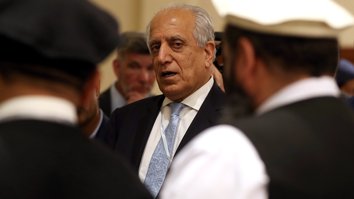KABUL -- At least 14 civilians, including women and children, were killed Tuesday (September 29) by a roadside bomb in Daikundi Province, officials said, as violence continues despite peace talks between the Taliban and Afghan government.
Seven women, five children and two men died when their vehicle detonated an explosive device in Kajran District, Interior Affairs Ministry spokesman Tariq Arian said in a statement.
Three children were wounded, he added, blaming the Taliban for the blast.
The victims were travelling to a shrine when their minibus struck the bomb, said Nasrullah Ghori, a spokesman for the governor of Daikundi.
![An Afghan security officer May 30 in Kabul investigates a damaged vehicle after a roadside bombing. The vehicle was carrying employees of Khurshid TV. A reporter and the driver were killed. Such roadside bombs are continuing to kill civilians despite the start of peace talks between the Afghan government and the Taliban. [STR/AFP]](/cnmi_st/images/2020/09/29/26303-000_1sk1ab-585_329.jpg)
An Afghan security officer May 30 in Kabul investigates a damaged vehicle after a roadside bombing. The vehicle was carrying employees of Khurshid TV. A reporter and the driver were killed. Such roadside bombs are continuing to kill civilians despite the start of peace talks between the Afghan government and the Taliban. [STR/AFP]
No group has claimed responsibility, but roadside bombs have been a weapon of choice for the Taliban.
"Deliberate attacks" targeting civilians killed or wounded more than 800 civilians in Afghanistan during the first half of 2020, according to a United Nations report released in July.
The violence comes as Taliban and Afghan government negotiators are meeting in Doha, Qatar, where they are trying to find a way to end 19 years of war.
Despite calls for a ceasefire, the Taliban have refused to halt their violence, seeing it as key to leverage at the negotiating table.
Seeking regional consensus
The blast came as High Council for National Reconciliation Chairman Abdullah Abdullah kicked off the second day of a three-day visit to Pakistan.
Speaking at an event in Islamabad, he proclaimed that the "ice has been broken" at peace talks, which started September 12.
"Abdullah's visit will greatly help to strengthen relations with Afghanistan and forge a common understanding on the Afghan peace process," Pakistan's Foreign Ministry said in a statement after Abdullah discussed the peace process with Foreign Minister Shah Mahmood Qureshi.
"Qureshi underlined the high importance Pakistan attached to its brotherly relations with Afghanistan," the ministry said, adding that the return of millions of Afghan refugees residing in Pakistan must be included in the peace talks.
Negotiations in Doha have slowed as the two sides grapple with several foundational issues, including which interpretation of Islam should frame Afghanistan's future.
"Definitely things take time," Khairullah Khairkhaw, a senior member of the Taliban negotiating team, told reporters in Doha.
"There are many issues, 20 or more, that need clarity," he said.

![High Council for National Reconciliation Chairman Abdullah Abdullah (right) and Pakistani Foreign Minister Shah Mahmood Qureshi attend an event at the Institute of Strategic Studies Islamabad on September 29. [Aamir Qureshi/AFP]](/cnmi_st/images/2020/09/29/26301-000_8qx9u4-585_329.jpg)







You should not believe in the remarks of Pakistan and don’t be deceived by Pakistanis. Pakistan has never been stick to its promises. Pakistan is all mouth.
Reply4 Comment
Abdullah Abdullah, Chairman of the High Council for National Reconciliation of Afghanistan is trying to undermine the position of President Ashraf Ghani in the peace process, and take revenge on Ashraf Ghani for the elections fraud and remove him from the power and form an interim government, which is also the demand of Taliban. In reference to the peace talks in Qatar, he said at the Institute of Strategic Studies in Pakistan that the ice is broken. He meant that the talks which have started between the Afghan government and Taliban in Doha will give result, and he was ready to accept the demands of Taliban. He seemed very pleased with the intra-Afghan talks. On the other hand, Ashraf Ghani and his vice presidents are trying to destroy the peace process so that they remain in power. Every day they speak against Taliban to make Taliban obnoxious before the people. It also seems from the government’s reluctance that the United States is not with the government any longer and the United States is obliged to make Taliban share power in the government.
Reply4 Comment
We used to follow Salaam Times' papers in Loy Kandahar especially in Helmand and we read its articles, but unfortunately neither it publishes good news nor bad news about Helmand. Fighting takes place in Helmand every day, while you are keeping quiet about it. Similarly, there are hundreds of good news such as projects' inauguration, news of the progress of Helmand, water and agriculture of Helmand etc. Why don't you publish reports on it? You think the news exist only in Kunduz, Herat and Kabul and everything is fine in Helmand? The main hub of the news is Helmand… and if you want to increase the number of your readers, you may also publish reports on Helmand. Thanks
ReplyIn fact, mostly the media outlets do not write reports and analyses on the Pashtun populated areas. Hazaras and Tajiks are also our compatriots and we love them, we respect all, but Pashtuns' situation should also be considered. The biggest sacrifice in this war was given by Pashtuns as on one side they are killed and their schools, clinics, roads and other infrastructures are destroyed by Taliban and on the other side, they were bombarded, killed and forced by the government and coalition forces to flee; however, the privileges are given to the minorities.
Reply4 Comment